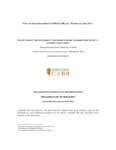Use este identificador para citar ou linkar para este item:
http://www.alice.cnptia.embrapa.br/alice/handle/doc/916057| Título: | View of stakeholders on GMOs in Brazil: where we are now? |
| Autoria: | CAPALBO, D. M. F.  ARANTES, O. M. N.   OLIVEIRA, P. R. S.   MAIA, A. G.   SILVEIRA, J. M. F. J. da   BORGES, I. C.   |
| Afiliação: | DEISE MARIA FONTANA CAPALBO, CNPMA; OLÍVIA MARCIA NAGY ARANTES, LAC-BIOSAFETY; PAULO RICARDO S. OLIVEIRA, IE-UNICAMP; ALEXANDRE GORI MAIA, IE-UNICAMP; JOSÉ MARIA FERREIRA JARDIM DA SILVEIRA, IE-UNICAMP; IZAIAS DE CARVALHO BORGES, IE-UNICAMP. |
| Ano de publicação: | 2011 |
| Referência: | In: ANNUAL CONFERENCE ON SUSTAINABILITY AND THE BIOECONOMY, 15., 2011, Rome. Sustainability and the bioeconomy. Rome: ICABR, 2011. |
| Páginas: | 22 p. |
| Conteúdo: | ABSTRACT: Transgenic crops have being grown in Brazil since 1995, however regulation for such crops only came into force in 2005, granting a key role to CTNBio (National Technical Committee on Biosafety). There are currently 19 transgenic varieties growing in Brazil and the risk perception of the general public is virtually unknown. This paper presents the results of a survey regarding the public´s risk perception. The survey is part of LAC-Biosafety, a multi-country capacity building project in compliance with the Cartagena Protocol on Biosafety (CPB) determinations. It is a pioneering initiative that seeks to promote cooperation among Brazil, Colombia, Costa Rica and Peru, all of which are considered mega-diverse countries. Although some authors, such as Oda and Soares (2000), Vogt and Polino (2003), Massarani and Moreira (2005), Guivant (2006), Furnival and Pinheiro (2008) and Gonzales et al (2009a and b), have studied the population´s risk perception, this paper is groundbreaking in the sense that it explicitly incorporates in the same sample both users of the technology, and those who do not use the technology but are in some way affected by it. The conceptual model adopted for this study, based on Costa-Font et al (2008), Gracia (2003) and the EUROBAROMETRO methodology, considers that the decision-making, the public´s perception, the autonomy of decision and the subjective knowledge is a result of a combination of scientific information and objective knowledge and culture ? such as beliefs and values. The sample was made up of 1442 individuals who filled out an online questionnaire containing 15 questions. Among the main results, it can be highlighted that (1) the general public considers the terminology used for means of communication inadequate; (2) knowledge about the GMO regulations, the Cartagena Protocol and the CTNBio is insufficient; (3) The negative perception is higher for terms such as ´transgenic plant´ and ´GMO´ and lower for terms such as ´biotechnology´ and ´genetic engineering´; (4) the public´s perception of transgenic plants destined for drugs production is better than of those destined for food production; (5) the public is more confident about information supplied by scientists and professors than that supplied by the government, the media and NGOs, even though these are the main channels for spreading information these days. |
| Thesagro: | Organismo transgênico |
| NAL Thesaurus: | Genetically modified organisms |
| Palavras-chave: | OGMs |
| Tipo do material: | Artigo em anais e proceedings |
| Acesso: | openAccess |
| Aparece nas coleções: | Artigo em anais de congresso (CNPMA)  |
Arquivos associados a este item:
| Arquivo | Descrição | Tamanho | Formato | |
|---|---|---|---|---|
| 2011AA36.pdf | 343,67 kB | Adobe PDF |  Visualizar/Abrir |









